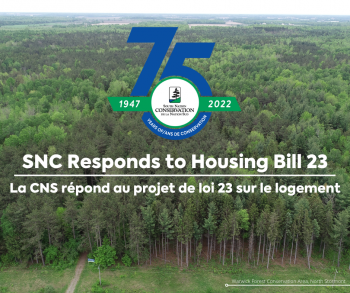“Loss of Local Decision-Making” – Conservation Authorities Respond to Province’s Housing Bill 23 “More Homes Built Faster Act”

In a bid to address the housing supply, the Ontario government released a series of proposed legislative changes, many of which impact Ontario’s 36 Conservation Authorities.
Among them, the Province proposes to prevent municipalities from entering into agreements with Conservation Authorities (CAs) to review planning applications on their behalf, proposes exemptions from natural hazard permits for select municipalities, removes ‘conservation of lands’ and ‘pollution’ as considerations in permit decisions, freezes development fees, changes the evaluation and protection criteria for Provincially Significant Wetlands and requires CAs to identify conservation lands suitable for development.
Earlier this year, the Province published a “Housing Affordability Task Force Report” that introduced 55 recommendations to increase house supply in Ontario. CAs were not named within the report, demonstrating they are already proactively working with the development industry and all levels of government to ensure safe and sustainable development can occur while balancing the needs of people and the environment, the economy and ecology.
“Conservation Authorities are not a barrier to growth and CAs in high-growth areas of the province are already participating in a Timely Review Task Force with service level commitments of 14, 21, and 28 day reviews, compared to the Province’s 30 and 90 day timelines,” explains George Darouze, Deputy Mayor and Councillor, Osgoode Ward, City of Ottawa.
Bill 23 is a departure from recent amendments to the Conservation Authorities Act that directed CAs to focus their work on natural hazard related programs but allows municipalities to choose whether CAs provide technical advice based on their local needs and deliver programs in their municipalities through funding agreements.
“Our Conservation Authority works as our municipality’s environmental partner,” explains Mario Zanth, Mayor of the City of Clarence-Rockland, “CA staff have rolled out the red carpet to help provide timely development approvals to projects in environmentally significant areas. After the Ottawa River floods of 2017 and 2019, people understand the value and impact of the services they provide.”
While CAs are created through provincial legislation, they are largely funded and work for municipalities within their watersheds. South Nation Conservation (SNC) is one of the oldest environmental agencies in Ontario and has continued to expand its jurisdiction at the request of municipalities, first along the St. Lawrence River, and more recently, along the Ottawa River.
In Clarence-Rockland, an obvious step after the historic Ottawa River floods was to partner with the CA to complete updated natural hazard maps and to contract SNC to review development proposals on their behalf. The result has been a clear win-win for both organizations and the development community to help design sustainable communities, away from natural hazards, while protecting key natural heritage areas.
In Eastern Ontario, SNC has agreements with neighbouring agencies to streamline development review processes and deliver planning services to help municipalities short on resources meet their provincial requirements. Recently, SNC also expanded its septic system program into Leeds-Grenville to help municipalities meet their requirements under the Ontario Building Code after the local Health Unit stopped delivering this service.
These arrangements provide a watershed-based approach to land use planning decisions and coordinate resources to save taxpayer costs. SNC provides shared expertise instead of each of its 16 municipalities having their own hydrogeologist, biologist, and engineers.
“We have a long-standing and positive working relationship with SNC and we appreciate their feedback and expertise in helping us make good planning decisions,” added Pierre Leroux, Mayor of Russell Township, “the CA is a valued partner in providing valuable services to our community.”
Bill 23 also proposes changes to the classification and protection of Provincially Significant Wetlands (PSWs), areas where development activities require permission from CAs. SNC, unlike other CAs, only regulates development within PSWs and Locally Significant Wetlands (LSWs) that are studied and zoned locally by municipalities for protection. Wetlands minimize the risk of drought, reduce flooding by absorbing and storing excess water and help control erosion. The proposed changes will reduce the area of protected wetlands on the local landscape which means more potential for impacts to communities from flood and drought.
“SNC’s approach of supporting the municipality’s decisions regarding the required environmental protections and studies allows for local decision-making,” explains Steve Densham, Deputy Mayor Elect of the Township of North Stormont, “additionally, given the economies of scale with our CA, we benefit from lower cost and expertise that can efficiently and effectively meet our needs.”
FOR MORE INFORMATION:
Carl Bickerdike, Chief Administrative Officer, South Nation Conservation
cbickerdike@nation.on.ca | 1 877-984-2948.

